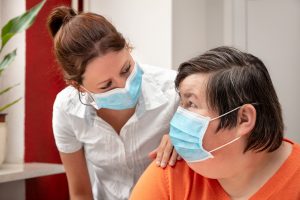Adults with a learning disability across the UK have experienced a major reduction in access to some care and support services, such as annual health checks and contact with a social worker, during the coronavirus pandemic.
 Over 60% of people with learning disabilities who had routinely seen healthcare professionals before the first lockdown in March 2020 had seen them less or not at all since then, while nearly half of people who usually had an annual health check had not received one since before March 2020.
Over 60% of people with learning disabilities who had routinely seen healthcare professionals before the first lockdown in March 2020 had seen them less or not at all since then, while nearly half of people who usually had an annual health check had not received one since before March 2020.
More than half of people with a learning disability who regularly saw a social worker before the first lockdown had not seen one at all since before March 2020. A third of people had appointments cancelled, while community activities, day services and respite support stopped for nearly all people with learning disabilities.
The findings are from the first report of a major UK study into the experiences of people with a learning disability during the pandemic. Learning disability organisations and universities from all four nations of the UK interviewed nearly 1,000 adults with a learning disability, in two cohorts.
In cohort 1 researchers interviewed 621 adults with a learning disability. In cohort 2, 378 family carers or paid support staff took part in an online survey about the experiences of the individual who they supported or cared for. These were likely to be adults with more severe to profound learning disabilities.
Findings from Wales
Learning Disability Wales joined with All Wales People First, All Wales Forum of Parents and Carers, Cardiff University, and the University of South Wales to interview people with a learning disability in Wales. In this article we are reporting on the findings from the full UK report. We will follow this with an in-depth look at the Welsh findings in the next week.
You can access the full UK report, highlights, and easy read version of the report, here.
Infections, shielding, health, and losing someone close to Covid-19
Across the two cohorts about 5% of people with a learning disability had received a positive test for coronavirus, with a further 5% people believing they had had Covid-19. (The cumulative figure for the UK population, up to 28th February 2021, is 6%). Of those who had contracted Covid-19, or suspected they had contracted, about 15% were hospitalised because of their symptoms.
More than 10% of people with learning disabilities said someone close to them had died due to COVID-19.
Over half of people with learning disabilities reported health conditions that were of concern if they had Covid-19 (51% in cohort 1, and 67% in cohort 2), with the most common health conditions being asthma and epilepsy.
When asked about shielding, 31% (cohort 1) and 58% (cohort 2) said they had shielded at some point since March 2020. In cohort 2, 30% of those shielding were not formally told to shield, but still felt that they needed to.
In cohort 2, 30% of family carers/paid support staff said the physical health of the person they support had changed for the worse since the first national lockdown in March 2020.
In cohort 1,12% of people with learning disabilities said they were caring for someone they were living with.
The vast majority of participants in both cohorts indicated that they, or the person they supported/cared for, would take the COVID-19 vaccine if it were offered to them.
Access to information and understanding rules about Covid-19
Asked about how easy it was to find good and accurate information about Covid-19, 70% of participants in cohort 1 said it was easy, while 30% said it was not easy. The vast majority of participants in cohort 1 (85%) said they understood the rules about Covid-19 and social distancing where they lived.
The majority of people in Cohort 1 found out about changes to COVID-19 rules and new information by watching television (76%), or by talking to their friends and family (43%) or support workers (35%).
In cohort 2, the family carer or paid supporter was asked to respond from their own perspective of accessing accurate information. Only 43% considered it easy to find accurate information about Covid-19. As with cohort 1, television (75%) was the most popular way of finding out information, but family carers/paid support staff in cohort 2 were more likely to use government websites (67%) and radio (39%), compared to people with learning disabilities in Cohort 1 (12% and 16% respectively).
Wellbeing
In cohort 1, over 65% of people with learning disabilities had felt angry or frustrated, sad or down, and worried or anxious at least some of the time in the four weeks before their interview. In cohort 2 over 60% of participants reported that the person they support/care for had worse well-being since the start of the first lockdown in March 2020.
According to the participants in cohort 2, the people with learning disabilities who they cared for/supported had overwhelmingly negative experiences during the pandemic. Some common responses were that they have found lockdown to be boring, lonely and isolating. Other participants reported that the physical and mental health of the person they support has deteriorated and that they are displaying behaviours that are challenging for family carers/paid support staff (e.g., harming themselves or others).
Carers in the cohort 2 survey reported that their health had been affected by their caring role in the last four weeks, most commonly disturbed sleep (57%), feeling tired (64%) and feeling stressed (65%).
Contact with friends and family
In cohort 2 over 85% of people with learning disabilities had some form of visitor restrictions where they lived, while over 65% reported they had experienced a negative impact as a result of visitor restrictions. This was particularly the case for people with profound and multiple learning disabilities (PMLD) (74%) compared to people without PMLD (63%).
In cohort 1 the majority of people with learning disabilities (72%) said they were staying in touch with important people in their lives as much as they wanted, with 92% reporting they used the internet at home.
Food and medicine
In both cohorts, participants were most commonly getting help with food shopping from their family members (40% in cohort 1, and 56% in cohort 2). Across both cohorts 1% of participants reported they were finding it difficult to get food. Very few people (1% or less) were getting food from a food bank. 5% of people with a learning disability in cohort 1 said they had been hungry in the last week but not eating.
A very small number of people in both cohorts (1%) were finding it difficult to get their medicines, and less than 1% of people in cohort 2 were not getting medicine at all. In both cohorts it was common for people with learning disabilities to receive medicines from family (25% in cohort 1, and 53% in cohort 2), or to have them delivered from the pharmacy or chemist (38% in cohort 1, and 24% in cohort 2). People with learning disabilities in cohort 1 were more likely to get their medication on their own (28%), compared to cohort 2 (4%).
Employment and volunteering
Of the 32% of people with learning disabilities in cohort 1 who had a job before the March 2020 lockdown, 88% were still in employment (still working, furloughed, or with their job held for them).
Of the 50% of people with learning disabilities in cohort 1 who did volunteer work before the March 2020 lockdown, 81% had kept their volunteer role during this wave of the study, even if they were not currently working.
What happens next?
The second phase of interviews and surveys will be starting in late March 2021 with researchers speaking again to people who took part in the first phase.
We are still hoping a few new people will join the study. Please get in touch with the research team, using the contact details below, if you are:
- A person with learning disabilities who is from an ethnic minority background
- Supporting a person with learning disabilities who is from an ethnic minority background and who would not be able to take part in an interview with a researcher themselves, or
- Supporting a person with learning disabilities who does not live in their family home and who would not be able to take part in an interview with a researcher themselves.
More information
Edward Oloidi, University of South Wales, email edward.oloidi@southwales.ac.uk or phone 01443 483 042.
Karen Warner, Learning Disability Wales, email karen.warner@ldw.org.uk or phone 029 2086 1160.
Coronavirus and people with learning disabilities website
Learning Disability Wales website page about the Welsh study



 >
>
 >
>
